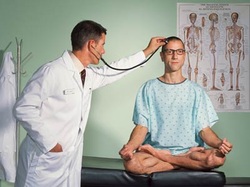FAQ's

We all have questions, some more than others, but asking questions always helps one learn and make better informed decisions. Below is a short list (of a much longer list) of FAQ we have received in our office.
Should you have a question or concern which is not listed below, please feel free to contact us and ask. We strive to keep you as informed and educated about your health and what we do.
1. What exactly is chiropractic?
Manual manipulation of the spine and other joints in the body have been around for a long time. Ancient writings from China and Greece dating between 2700 B.C. and 1500 B.C. mention spinal manipulation and the maneuvering of the lower extremities to ease low back pain. In fact, Hippocrates, the famous Greek physician who lived from 460 to 357 B.C., published a text detailing the importance of manual manipulation. In one of his writings he declares, "Get knowledge of the spine, for this is the requisite for many diseases". Evidence of manual manipulation of the body has been found among the ancient civilizations of Egypt, Babylon, Syria, Japan, the Incas, Mayans and Native Americans.
The official beginning of the chiropractic profession dates back to 1895 when Daniel David Palmer restored the hearing of Harvey Lillard by manually adjusting his neck and something told him that he was on to something good. Two years later, in 1897, Dr. Palmer went on to begin the Palmer School of Chiropractic in Davenport, Iowa, which continues to train doctors of chiropractic to this day.
Throughout the twentieth century, the profession of chiropractic has gained considerable recognition and scientific support. Research studies that have clearly demonstrated the value of chiropractic care in reducing health care costs, improving recovery rates and increasing patient satisfaction. In fact, one very large study conducted in Canada, the 1993 Manga Study, concluded that chiropractic care would save hundreds of millions of dollars annually in work disability payments and direct health care costs. Several major studies conducted by the U.S. Government, the Rand Corporation and others, have all demonstrated the incredible value of chiropractic care.
2. Once I start, will I always have to be adjusted and as often?
This is one of the most asked questions a chiropractor gets! Our goal is to get you out of pain and back to your full life as quickly as possible, given your specific condition. Much like a dentist, once you are out of pain, it is a sound idea to have regular checks up to PREVENT any further dental problems form occurring. After you have started to recover, the exercises that are discussed during your treatment should be done (much like brushing your teeth) as they will help your body adapt and hold to the adjustments better as well as helping prevent future problems from happening. Dr. Karl does advise regular chiropractic checkups to assure that your spine is in the best shape to keep you fully active in your lifestyle.
3. Does it hurt?
The adjustment itself is normally pain free, but for some people who have acute or chronic pain may have some mild discomfort with the adjustment. We always advise and inform the new patients that if they feel any discomfort or are uncomfortable to let Dr. Karl know as he can alter how he adjust to make you more comfortable. Many changes will be taking place during and after your treatments and there are some which may cause some minor discomfort. Some patients report slight soreness in the areas which were adjusted which is not uncommon. The muscles and ligaments in these areas have been pulling or functioning improperly for quite some time. After being adjusted, they are now functioning correctly and pulling as they should, so some soreness may be expected and is usually quite mild and is temporary.
4. What is that noise?
The noise heard, and sometimes felt, is created naturally from the areas of the joints being adjusted. Within each joint there is fluid (called synovial fluid) which acts as a lubricant in the joint and contains the gases oxygen, nitrogen, and carbon dioxide . During the adjustment, the pressure of the joint is changed causing these gasses to form bubbles and escape resulting in the noise heard. This is the same noise that one hears when you crack your knuckles.
5. Who can be adjusted?
Anyone with a spine. Dr. Karl has seen patient a range of patients from the youngest infant (90 minutes old) to 90 year olds.
Even expectant mother's may be adjusted during their pregnancy - which improves their pregnancy and makes delivery easier for themselves as well as the baby. Dr. Karl's adjusting methods are always adaptive for patients of any size, weight, age, and condition of health.
6. Chiropractor Qualifications and Education.
Both chiropractors and medical doctors receive very similar educations. They vary only in that chiropractors do not prescribe medication or preform surgeries and that medical doctors do not correct spinal fixations.
Upon graduating from school, each new Doctor of Chiropractic (D.C.) must pass a comprehensive, intense, and stringent four part National Board Exam, which contains not only written exams but also an intense practical administration as well as x-ray analysis. Once passed, they have to apply to the state specific governmental licensing board at which point they will be given another test which they must pass before being granted the privilege to practice.
Education does not end there. Every year, chiropractors are required to complete regular post-doctorate instruction and classes for their license renewal as well as to keep current and educated about the latest research.
7. How can I afford this?
Good question! Certainly the question on everyone's mind and wallets. We offer a variety of ways to pay for your services, check out our Payment Options Page
Core Health & Wellness Center - 1755 E. Plumb Ln - Suite 201, Reno,NV 89502 -- New Patients Schedule Your Appointment Blog Services Contact Us

